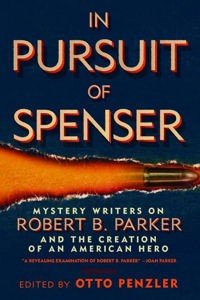 Edited by Otto Penzler – In Pursuit of Spenser will certainly shed some light on its titular iconic PI. But Otto Penzler’s edited collection of essays is even more informative about Spenser’s creator. And through Bob Parker (as contributors always refer to him), we learn more about his literary creations: mostly Spenser, but also Jesse Stone and various Western adventurers.
Edited by Otto Penzler – In Pursuit of Spenser will certainly shed some light on its titular iconic PI. But Otto Penzler’s edited collection of essays is even more informative about Spenser’s creator. And through Bob Parker (as contributors always refer to him), we learn more about his literary creations: mostly Spenser, but also Jesse Stone and various Western adventurers.
The list of contributors is a Who’s Who of crime fiction in general, and private eye fiction in particular. Dennis Lehane, Lawrence Block, SJ Rozan, Max Allan Collins and Ed Gorman, among others, all reminisce about Robert B Parker’s writing, his influence and his distinct contribution to the hardboiled genre. Parker passed away in 2010, and some of the contributors knew Parker better than others. However each tries to illuminate a particular aspect of his persona or writing – the two are often intertwined.
Dennis Lehane and Jeremiah Healy both shared Boston with Robert B Parker, and their chapters are particularly interesting. Healy was a bit more influenced by Parker and Spenser than Lehane was, but Bob Parker cast a long shadow over Beantown when both were starting out. They both found themselves beneficiaries of Parker’s generous and winsome presence. Lehane’s story about threatening a nine-year-old with physical harm – abetted by Parker – is worth the price of the book. But don’t fret – no children were harmed in the making of these memories.
Not surprisingly, Hawk and Susan Silverman are frequently discussed by contributors. A PI who collaborated with an African American and a woman, treating them both as equals because they were, was uncommon when Robert B Parker introduced both characters. Still, Hawk became Parker’s most beloved character after Spenser. Hardboiled scribe Gary Phillips is insightful in his analysis of Hawk’s development over the series. S.J Rozan has a tougher task, but confronts the distaste many Spenser fans have for Susan and gives an able defense of the character.
Robert B Parker is perhaps fortunate that his writings sold so well and for so long that people remember Spenser from the ubiquitous books and not second-hand, from the 80s television series starring Robert Urich. Of course, Spenser: For Hire was good in its own right, but Parker regarded the books and show as very different beasts. While the enduring appeal of Spenser novels is cause for celebration, it’s a shame that the show has never been re-released on DVD. Several of the contributors discuss Spenser: For Hire, and Max Allan Collins gives an even-handed overview of the series and the telefilms that followed it. While Robert B Parker had his reservations about Urich in the role of Spenser, readers will likely be surprised to learn television producers’ second choice to fill the role.
There are plenty of fascinating tidbits of information and intriguing anecdotes are woven throughout In Pursuit of Spenser. Lyndsay Faye doesn’t share any personal reminiscences of Parker, but has certainly interacted with the food that is frequently referenced in Spenser novels. Like your humble correspondent, Faye was inspired by Spenser to make Coquilles St Jacques for a romantic evening, and includes her recipe for the classic French dish.
We might never have expected a hardboiled private dick to double as Julia Child, but such was the extent of Robert B Parker’s innovation within the genre. If you are a fan of Spenser, an admirer of Parker, or vice versa, you will find a great deal to enjoy. I might wish for one chapter presenting a more literary analysis of Parker’s place in the development of hardboiled literature, a theme that is alluded to but never fully developed. As might be expected from the tributary nature of the volume, contributors largely gloss over the declining quality in Spenser novels during Parker’s later years when quantity was evidently a good deal more profitable than quality.
But these quibbles do not negate Robert B Parker’s prodigious contribution to hardboiled crime fiction, or the very many themes from Parker’s novels that In Pursuit of Spenser explores insightfully. Readers who are not yet familiar with Spenser may or may not enjoy reading about various authors’ remembrances and interpretations of the PI’s exploits. But if you’ve enjoyed a few Spensers (or perhaps Jesse Stone, Sunny Randall or even Virgil Cole and Everett Hitch) and would like to know more about the man who reinvigorated hardboiled fiction, you won’t find a better compendium than In Pursuit of Spenser.
BenBella Books
Print/Kindle
£6.71
CFL Rating: 4 Stars








